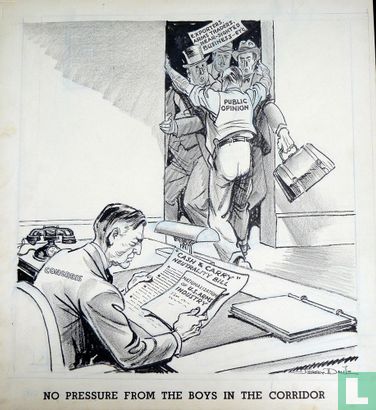Enlarge image
Catalogue information
LastDodo number
5221539
Area
Drawings / paintings
Title
No Pressure from the Boys in the Corridor
Artist
Art object
Art Movement / style
Genre
Material
Technique used
Colouring
Dimensions
46 x 43 cm
Series / hero
Collection / set
Number
Addition to number
Year
1937
Country
Language
Details
Original editorial cartoon drawing in pen and ink and crayon on board, published in the Philadelphia Record in 1937, shows a member of Congress (identity unknown) poring over the ‘Cash & Carry’ Neutrality Bill and a paper on ‘Nationalization of US arms industry’ while ‘exporters, arms traders, near-sighted business - etc’ are trying hard to get their voices heard and being restrained by ‘public opinion’, which was largely in favour of neutrality. Neutrality Acts were passed by the United States Congress in the 1930s, in response to the growing turmoil in Europe and Asia that eventually led to World War II. They were spurred by the growth in isolationism and non-interventionism in the US following its costly involvement in World War I, and sought to ensure that the US would not become entangled again in foreign conflicts. The Neutrality Act of 1937 included the provisions of the earlier acts, this time without expiration date, and extended them to cover civil wars as well (e.g. Spain). Furthermore, US ships were prohibited from transporting any passengers or articles to belligerents, and U.S. citizens were forbidden from traveling on ships of belligerent nations. In a concession to President Roosevelt, a "cash-and-carry" provision was added: the President could permit the sale of materials and supplies to belligerents in Europe as long as the recipients arranged for the transport and paid immediately in cash, with the argument that this would not draw the US into the conflict. Roosevelt believed that cash-and-carry would aid France and Great Britain in the event of a war with Germany, since they were the only countries that controlled the seas and were able to take advantage of the provision. The nationalization proposal probably arose from Roosevelt’s concern about America’s state of preparedness for war, and such a nationalization would enable the country to control the arms industry. Board size 46 x 43 cm (18 x 17 inch), image size 40 x 37 cm. Signed bottom right, in excellent condition.

